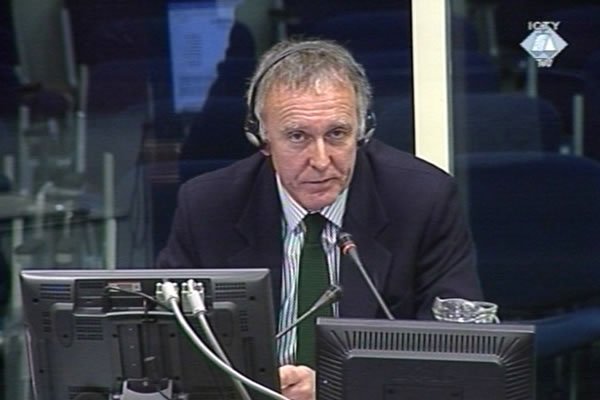Home
KRAJINA, KOSOVO AND NEW ORLEANS: SIMILAR OR DIFFERENT?
Mladen Markac’s defense tried to prove that the crime wave in Krajina after Operation Storm was an entirely normal consequence of the conflict. Defense expert Christopher Albiston agreed, noting that the situation was similar in Northern Ireland and Kosovo after the conflicts there. The defense counsel then asked the witness to compare the situation in Krajina to the criminals on the rampage in New Orleans after Katrina and in Paris after the street rioting
 Christopher Albiston, svjedok odbrane Ivana Čermaka
Christopher Albiston, svjedok odbrane Ivana Čermaka The hearing today began with the defense of the former Croatian Special Police commander Mladen Markac cross-examining the British police expert Christopher Albiston. Defense counsel Goran Mikulicic tried to prove that an increase in crime after Operation Storm was nothing out of the ordinary, and that the police could do nothing to deal with the perpetrators. Albiston has been called by the defense of the former Knin Garrison commander Ivan Cermak. Together with generals Gotovina and Markac, Cermak is on trial for crimes against Serb civilians and their property during and after Operation Storm in the summer of 1995.
In his examination-in chief yesterday, Albiston denied that Cermak had any links with the civilian police; at the time the police didn’t have enough personnel and technical resources to fight the wave of looting and arson in the recently liberated territory. Defense counsel Mikulicic put it to the witness that an increase in crime is normal in post-conflict situations, and asked him to recall his experiences from Northern Ireland and Kosovo. Albiston was stationed there immediately after the conflicts as a high-ranking police official.
Criminals and gangsters of all sorts tried to exploit the fact that law and order had not been completely restored, the British expert said. The defense counsel then went one step further, asking the witness to compare the situation in Krajina to that in New Orleans after hurricane Katrina and in Paris after the street riots when criminals went on the rampage. The prosecutor objected, prompting the presiding judge to interrupt the defense counsel. Judge Orie noted there was no foundation for those questions because the witness wasn’t there when those events occurred.
Prosecutor Katrina Gustafson took the floor then to start the cross-examination. She picked up on Albiston’s conclusion that under the military laws and regulations, General Cermak had no authority over the civilian police in the liberated territory, asking the witness what had led him to conclude that the accused general was working on normalizing life in Knin and its environs and liaising with the media and the international community, since those tasks were not listed among Cermak’s duties in any legal document. Albiston replied that his conclusions were based on what Cermak did in practice.
The prosecution is trying to prove that in practice the accused issued orders to the civilian police, too. Today, the witness was shown a report from the UN mission in Knin, stating that Cermak promised to the international observers he would ‘issue an instruction’ to the police to participate in joint patrols with them. According to Albiston, this doesn’t mean that the Knin Garrison commander had authority over the police. The witness contends that the document only shows that Cermak ‘had an impression’ that he had the authority to issue operative instructions to the police. This however doesn’t mean that he actually did have it.
The witness didn’t entirely reject the suggestion that President Tudjman might have given Cermak authority over the civilian police off the record, adding that he didn’t deal with that hypothesis in his report.
Christopher Albiston’s cross-examination will continue tomorrow.
Linked Reports
- Case : Gotovina et al. - "Operation Storm"
- 2009-11-02 CROATIAN BUSINESSMEN IN CERMAK’S DEFENSE
- 2009-10-30 CERMAK’S ‘REQUESTS’ TO THE POLICE
- 2009-10-29 POLICE MADE ARRESTS ONLY WHEN THEY DARED
- 2009-11-05 CROATIAN POLICE WAS AFRAID
- 2009-11-06 GENERAL CERMAK ‘INCREDIBLY UNQUALIFIED’
- 2009-11-09 CERMAK RECEIVED REPORTS ‘AS A COURTESY’
